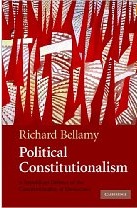










 |
||||||||||
 |
|
 |
|
 |
|
 |
|
 |
|
|
 |
 |
 |
 |
 |
||||||

Richard Bellamy, Political Constitutionalism Selection Committee: From the committee's report: In a lively and powerful style, Bellamy's book brilliantly discusses the three main political traditions (liberalism, republicanism and democracy) according to a very timely and important issue: the relationship between politics and human rights. Bellamy criticizes legal constitutionalism as opposed to political constitutionalism and argues that democracy is a constitutionalized politics, and in this sense constitutionalism is not the domain of judges and lawyers because it states not merely rights and the rule of law but also, and moreover, the political institutions that are to implement those rights. "In fact, the rule of law, in the sense of all being equal under the law, emerged from the self-same process of economic development and social pluralism that gave rise to democracy, and has only survived and developed in those societies where the democratic control of power and the socio-economic conditions that support it persist" (p. 2). Bellamy argues convincingly that a reading of the constitution as a stop on and containment of politics is the main source of misunderstanding in present debate on democracy and the rights. Moreover, in making his case he discusses, very intelligently and effectively, both the liberal and the republican theories of liberty, and makes us see how modern neo-roman republicanism represents an inversion rather than an evolution of classical republicanism, insofar as it opposes the "republic of reason" and impartial judgment to the republic of politics. You may view a list of prizewinners and learn more about individual books through our Spitz Prize page. |
2010 Spitz Prize Sharon Krause The David and Elaine Spitz Prize Recent Reviews
|